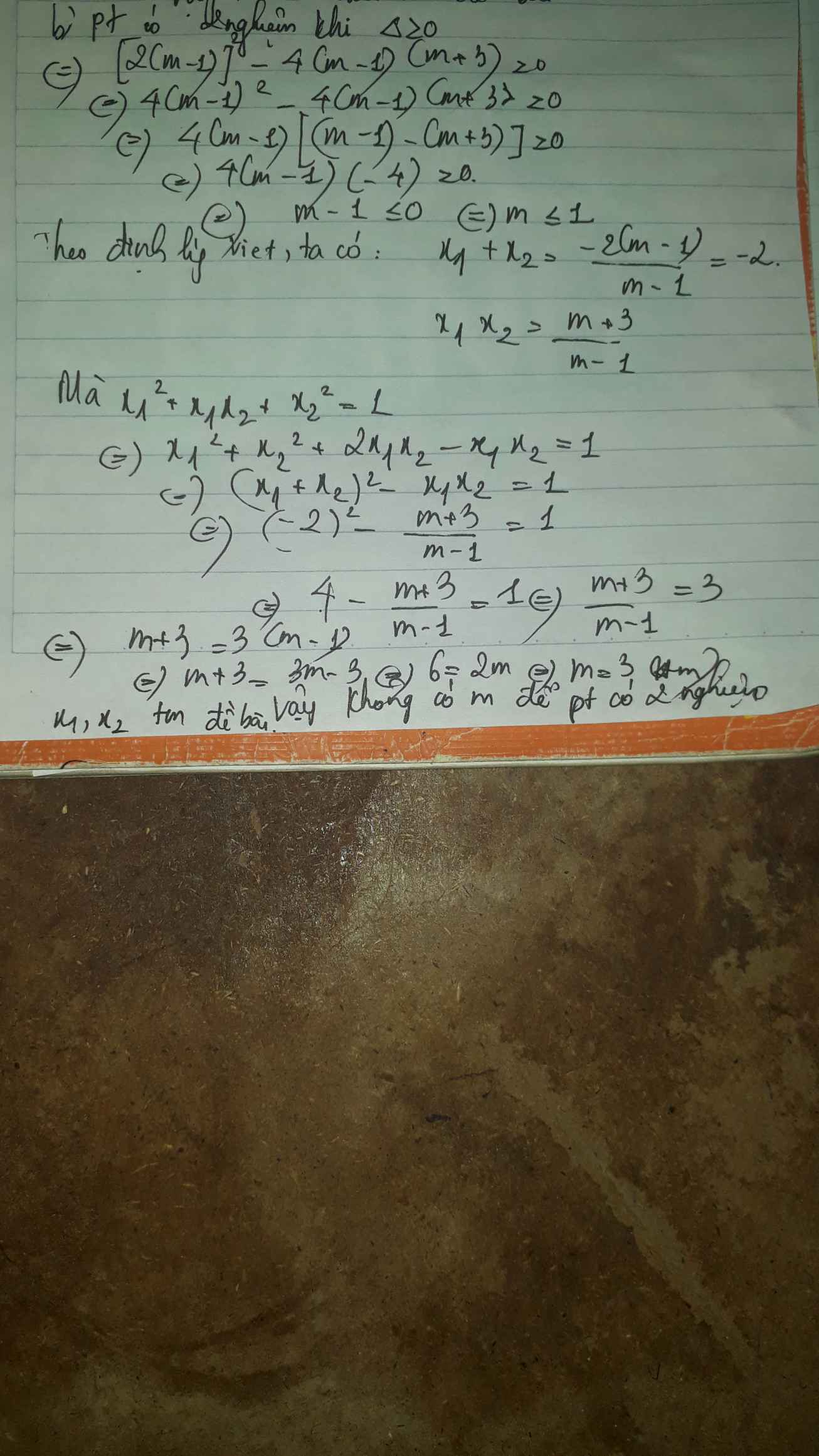Hãy nhập câu hỏi của bạn vào đây, nếu là tài khoản VIP, bạn sẽ được ưu tiên trả lời.

Δ=(2m+2)^2-4(-m-5)
=4m^2+8m+4+4m+20
=4m^2+12m+24
=4(m^2+3m+6)
=4(m^2+2*m*3/2+9/4+15/4)
=4(m+3/2)^2+15>=15
=>PT luôn có 2 nghiệm
(x1-x2)^2-x1(x1+3)-x2(x2+3)=-4
=>(x1+x2)^2-4x1x2-(x1+x2)^2+2x1x2-3(x1+x2)=-4
=>-2(-m-5)-3(2m+2)=-4
=>2m+10-6m-6=-4
=>-4m+4=-4
=>-4m=-8
=>m=2

b) phương trình có 2 nghiệm \(\Leftrightarrow\Delta'\ge0\)
\(\Leftrightarrow\left(m-1\right)^2-\left(m-1\right)\left(m+3\right)\ge0\)
\(\Leftrightarrow m^2-2m+1-m^2-3m+m+3\ge0\)
\(\Leftrightarrow-4m+4\ge0\)
\(\Leftrightarrow m\le1\)
Ta có: \(x_1^2+x_1x_2+x_2^2=1\)
\(\Leftrightarrow\left(x_1+x_2\right)^2-2x_1x_2=1\)
Theo viet: \(\left\{{}\begin{matrix}x_1+x_2=-\dfrac{b}{a}=2\left(m-1\right)\\x_1x_2=\dfrac{c}{a}=m+3\end{matrix}\right.\)
\(\Leftrightarrow\left[-2\left(m-1\right)^2\right]-2\left(m+3\right)=1\)
\(\Leftrightarrow4m^2-8m+4-2m-6-1=0\)
\(\Leftrightarrow4m^2-10m-3=0\)
\(\Leftrightarrow\left[{}\begin{matrix}m_1=\dfrac{5+\sqrt{37}}{4}\left(ktm\right)\\m_2=\dfrac{5-\sqrt{37}}{4}\left(tm\right)\end{matrix}\right.\Rightarrow m=\dfrac{5-\sqrt{37}}{4}\)

Δ=(2m-2)^2-4(m^2-4)
=4m^2-8m+4-4m^2+16=-8m+20
Để phương trình có hai nghiệm phân biệt thì -8m+20>0
=>m<5/2
x1(x1-3)+x2(x2-3)=6
=>x1^2+x2^2-3(x1+x2)=6
=>(x1+x2)^2-2x1x2-3(x1+x2)=6
=>(2m-2)^2-3(2m-2)-2m^2+8=6
=>4m^2-8m+4-6m+6-2m^2+8=6
=>2m^2-14m+12=0
=>m^2-7m+6=0
=>m=1(nhận) hoặc m=6(loại)

PT có 2 nghiệm phân biệt \(\Leftrightarrow\Delta=\left(2m-3\right)^2-4\left(m-3\right)=9>0\)
Vậy PT có 2 nghiệm phân biệt với mọi m
Ta có \(\left[{}\begin{matrix}x_1=\dfrac{2m-3+3}{2}=m\\x_2=\dfrac{2m-3-3}{2}=m-3\end{matrix}\right.\)
Ta thấy \(m>m-3\) nên \(1< m-3< m< 6\Leftrightarrow4< m< 6\)
Vậy \(4< m< 6\) thỏa yêu cầu đề

\(\text{Δ}=\left(-4n\right)^2-4\left(12n-9\right)\)
\(=16n^2-48n+36\)
\(=\left(4n-6\right)^2\)>=0
=>Phương trình luôn có hai nghiệm
Theo đề, ta có: \(2x_1x_2+3\left(x_1+x_2\right)-54=0\)
\(\Leftrightarrow2\left(12n-9\right)+3\cdot4n-54=0\)
=>24n-18+12n-54=0
=>36n-72=0
hay n=2
